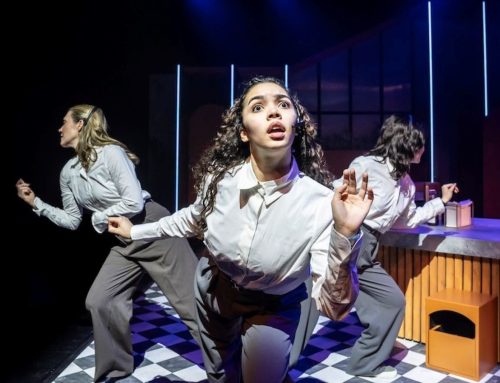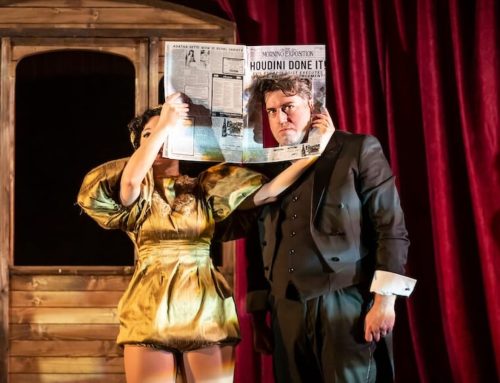Christopher Wollaton’s Brawn has something to say about the psychology of male body dysmorphia, but as a story it lacks substance.
3 September 2022
As a monologue performer Christopher Wollaton certainly exudes energy. He bobs and weaves around the small stage of the King’s Head Theatre like a boxer on speed, periodically interrupting his perambulations with a set of dumbbell reps. The sweat pours off him by the end of the show. Even watching him is exhausting. The problem with Brawn lies not with the strength, acting skill, or commitment the performer brings. It is just that the character he has written feels indistinct and the story unfinished.
Body-builder Ryan spends most of his leisure time working out and avoiding text messages from his needy semi-girlfriend Becky. He is fond of her. It is just that a relationship, any relationship, gets in the way of achieving the perfect body. He knows he looks boss. The girls love him. Even his high school love, who jilted him for the super-fit football team captain, now concedes he looks good. His workmates in dad’s firm now respect him too, which is a change from how things used to be. He is 80% of the way there. Just 20% more needed and he will be the man he has always wanted to be.
As an analysis of the driving forces of male body dysmorphia all the elements are spot on. Ryan’s low self-esteem, hyper-vigilance towards any kind of criticism of his appearance, rigid notions of masculinity, and tendency towards obsessive compulsive behaviour come through clearly. He is the type of character whose extreme preoccupation with how he looks is immediately recognisably by gym-goers.
But who Ryan is, beyond a set of more or less stereotypically dysmorphic behaviours, remains vexingly out of focus. Being dumped for a fitter guy might well have spurred his fitness addiction. But beyond that, there is no sense of the character gaining any kind of self-awareness or of moving forward from that event. Stuck in an endless cycle of eat, sleep, gym, he begins and ends the monologue in the same place. With no dramatic journey to follow him on, the audience is left struggling to identify or empathise with him. The picture works, but the story does not.
Written and Performed by Christopher Wollaton
Directed by Elliot Taylor
Produced by Zoe Weldon
Duration: 65 minutes. No interval.
More Recent Reviews
Playfight. Soho Theatre.
Writer Julia Grogan’s breathtakingly assured debut play arrives at Soho Theatre following stellar reviews at the Edinburgh Fringe and [...]
All The Happy Things. Soho Theatre.
Naomi Denny’s three-hander comedy-drama All The Happy Things covers familiar themes within a recognisable premise. A grieving protagonist comes [...]
Telly. Bread and Roses Theatre.
The challenge with absurdist comedy is that many people do not find it funny. Laughing at the sheer weirdness [...]





